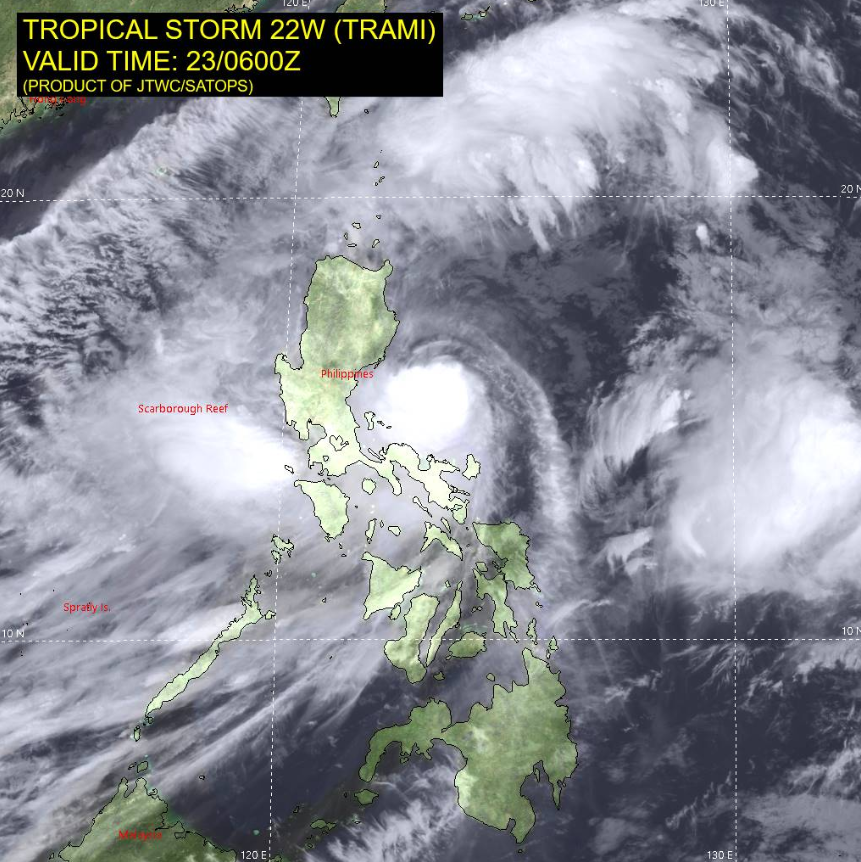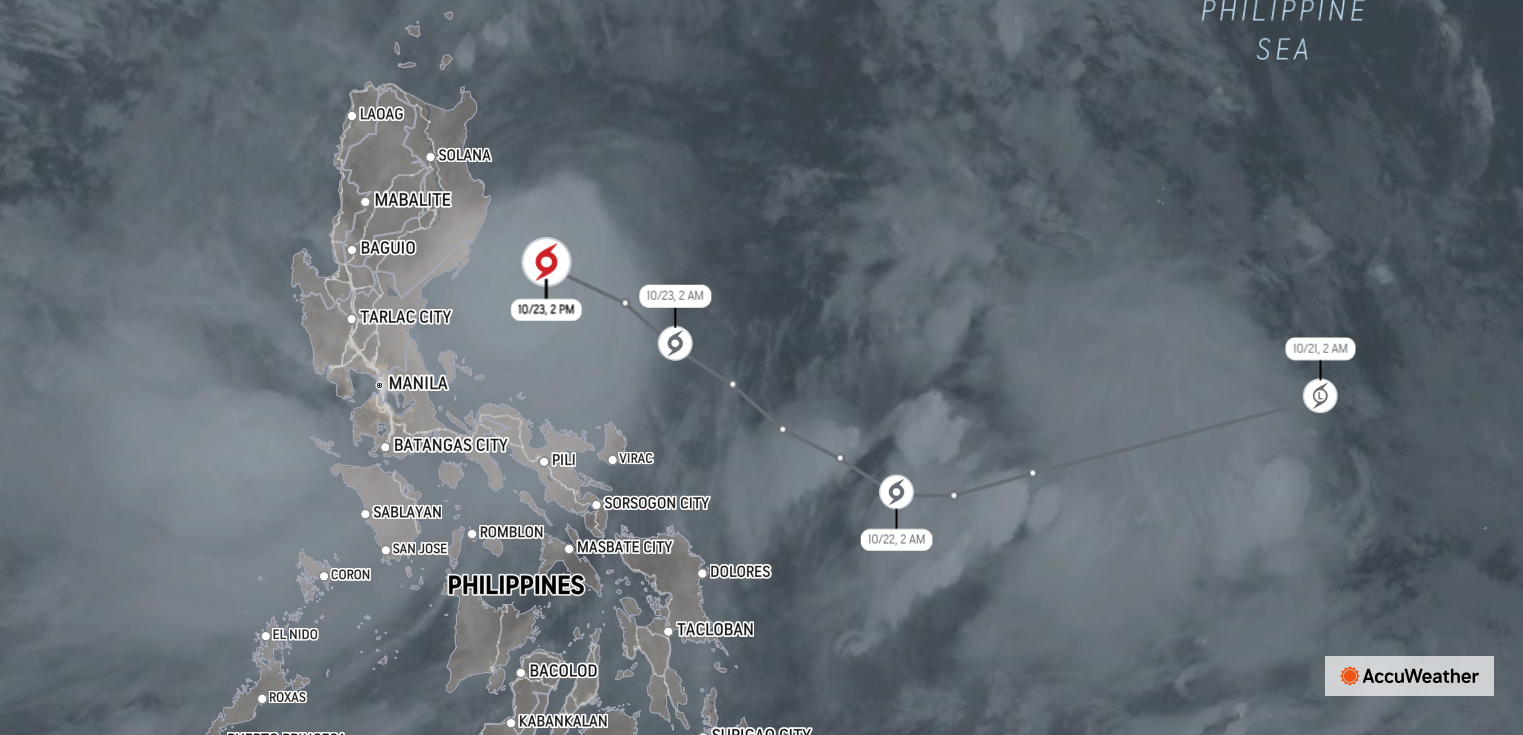Mapped: Tropical storm Trami wreaks havoc in Philippines and leaves 26 people dead
Thousands of people remain marooned in their homes

Your support helps us to tell the story
From reproductive rights to climate change to Big Tech, The Independent is on the ground when the story is developing. Whether it's investigating the financials of Elon Musk's pro-Trump PAC or producing our latest documentary, 'The A Word', which shines a light on the American women fighting for reproductive rights, we know how important it is to parse out the facts from the messaging.
At such a critical moment in US history, we need reporters on the ground. Your donation allows us to keep sending journalists to speak to both sides of the story.
The Independent is trusted by Americans across the entire political spectrum. And unlike many other quality news outlets, we choose not to lock Americans out of our reporting and analysis with paywalls. We believe quality journalism should be available to everyone, paid for by those who can afford it.
Your support makes all the difference.Torrential rains brought by tropical storm Trami triggered widespread flooding in eastern Philippines, leaving at least 26 people dead.
Thousands of people were marooned in their homes and on rooftops as emergency services struggled to respond to a deluge of rescue requests.
The storm, locally called Kristine, passed through the northeastern provinces, prompting the government to shut public schools and offices on the island of Luzon, except those directly involved in disaster response.
Trami was packing sustained winds of 95kmph as it barelled across the mountainous northern region of Cordillera towards the South China Sea, the state weather agency said on Thursday morning.
The storm killed at least 14 people in the central city of Naga and one each in Palanas town in Masbate and Bagamanoc town in Catanduanes, the Bicol regional civil defence office said in a statement.
Most of the deaths were due to drowning.

Thousands of people had been rescued but many more awaited evacuation as authorities struggled to navigate flooded roads and blocked pathways.
Authorities issued storm warnings in more than two dozen provinces, including capital Manila, which could be lashed by torrential rains despite not being in the storm’s path.
Trami’s broad rainbands were expected to bring up to eight inches of rainfall in some areas and cause landslides and flooding.
The storm made landfall on Wednesday night along the Aurora coast, and then sweep across northern Luzon’s mountainous regions, valleys and plains before moving into the South China Sea later in the week.


President Ferdinand Marcos Jr cancelled all his appointments “to focus on coordinating the government’s comprehensive search and rescue and relief efforts" and convened an emergency meeting at military headquarters to discuss disaster mitigation efforts, communications secretary Cesar Chavez said.
"People have been stuck on roofs of their houses for several hours now," former vice president Leni Robredo, who lives in the city of Naga, said in a social media post early on Wednesday. "Many of our rescue trucks have stalled due to the floods."
Ms Robredo hoped that the flooding would ease at low tide on Wednesday morning.


In Camarines Sur, one of the provinces hit the hardest, Congressman Luis Raymund Villafuerte called for national intervention. He said local authorities lacked the resources to deal with the scale of the disaster.
"Last night, my phone was filled with nonstop calls and text messages from people pleading, ‘Help us, rescue us’,” Mr Villafuerte said in an interview with DZRH radio.
“It is devastating when you feel helpless in the face of such overwhelming problems.”
He said they had only 50 rescue boats and needed at least 200 more to respond to all the distress calls.

The storm had already affected millions of people in the Philippines by Wednesday with floodwaters rising quickly in many areas. In the province of Quezon, governor Angelina Tan said that floodwaters reached up to 3m in some locations, forcing at least 8,000 people to evacuate. As rescue operations continued, Ms Tan emphasised the need for additional rescue personnel and equipment, including boats and trucks capable of navigating through the deluge.
Coast guard personnel were working to rescue people from flooded villages in Sorsogon, Albay, Camarines Sur since Tuesday. But provincial authorities admitted that the number of available rescue boats and personnel were insufficient to handle the volume of appeals for help.


Thousands of passengers and cargo workers were stranded at seaports after the coast guard suspended inter-island ferry services and barred fishing boats from sailing into the increasingly rough seas.
The Philippines is battered by nearly 20 storms and typhoons every year. Haiyan, one of the most powerful tropical cyclones ever recorded, devastated the central Philippines in 2013, leaving over 7,300 people dead or missing and displacing over five million.
The country is also located along the Pacific Ring of Fire, a region known for frequent volcanic eruptions and earthquakes, making it one of the most disaster-prone nations in the world.


The Malaysian Meteorological Department also issued an advisory on Trami, warning of heavy rainfall and strong winds in Sabah, Malay Mail reported.
It cautioned that the storm could trigger rough conditions in the South China Sea and the Sulu Sea, posing further risks to coastal areas. Residents were advised to stay alert and follow updates from local authorities as the storm progressed.
Additional reporting by agencies.
Join our commenting forum
Join thought-provoking conversations, follow other Independent readers and see their replies
Comments